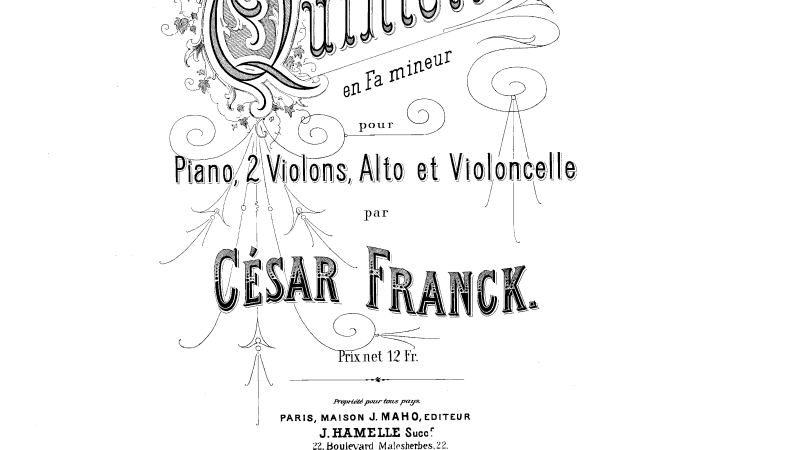Franck's Love Letter
February 1, 2018
Franck spent most of his life as sort-of outsider to the Parisian musical establishment. Born in Belgium in 1822, he showed musical talent early on and his father promoted him as a piano prodigy, to modest success. After giving up the life of a virtuoso in his 20s, he served as a church organist, a stable but low paying position, primarily at the basilica of Sainte-Clotilde in Paris. It wasn’t until he was 49, in 1872, that he was recognized with an organ professorship at the Paris Conservatoire and began gaining increased recognition for his compositions. Unusually, his life followed a reverse arc: the most notable parts of his career happened early and late in his life.
Franck's tenure at the Conservatoire started soon after the end of the Franco-Prussian War, a cataclysmic event that prompted a general reappraisal of French music. At the same time that Franck’s circumstances changed, France changed as well. The beginning of France’s Third Republic brought a new appreciation for classical forms and style rooted in the thought and technique of the past, qualities that had been missing from much music of the Second Republic. Franck, never a showman, was well suited to take advantage of that trend, and it brought about new opportunities to write instrumental music.

The first piece he wrote in his late burst of symphonic and chamber music was the Piano Quintet of 1879. It’s a huge piece—its vehement emotions threaten to spill out of its three movements, but the classicizing impulse of the time meant it was also highly structured. Of course, the piece uses sonata form, the ultimate classical method of controlling musical material over one movement. It then takes the unifying trend one step further and uses cyclic form, when themes are shared across movements. Bringing back a first-movement theme in a later movement wasn’t anything new—Mozart and Haydn did it a hundred years earlier—but in Franck’s time, due partly to the influence of Wagner, it became a standard technique. Franck’s use of classical forms, which in the 19th century was more of a German thing, earned him the nickname “the French Brahms.”
Despite its unifying features, the Piano Quintet sounds slightly out of control, its heavy emotions ready to boil over. One technique that Franck uses to create that emotional effect is near-constant modulation. (He used it in many of his works—Debussy called him a “modulating machine.”) His frequent key changes create a constant unsettled, roiling effect. The music sounds like it’s being stretched and pulled until it almost breaks. In the first movement, all the restless music eventually leads to a point so far away that it feels like the music is floating in space.
”[In] the last three chamber works... Franck found a balance between his inherent emotionalism and his preoccupation with counterpoint and Classical forms.” -Grove Music Online
The Piano Quintet didn’t just advance lofty goals like reviving classical principles in French music or stretching the boundaries of tonality. It also came about due to some very human relationships. Franck had a student named Augusta Holmès who inspired a lot of attention (the painter Georges Clairin reflected, “we were all in love with Augusta Holmès”). Franck was married but he was widely believed to have feelings for her. The issue came to a head at the quintet’s premiere: Camille Saint-Saëns, who played (and apparently sight-read) the piano part, grew angrier and angrier as he listened to the piece, finding it embarrassingly lovesick. He stormed off-stage afterward, ignoring the composer’s gift of the score. Modern critics have also grappled with the larger-than-life emotions of the piece:
“It was the Quintet that knocked audiences, and posterity, sideways. Nothing quite like the Quintet had been heard from Franck before, nor would anything quite like it come from him again. If Franck really did intend it as an extra-marital billet-doux [love letter], he made it a singularly disturbing one, containing a message of anguish that one hundred and thirty years—with all their musical revolutions—have not mollified.” César Franck: His Life and Times, -R.J. Stove
Franck was born in Belgium and was strongly influenced by Germans of his past and present. He also received a decidedly mixed reception during his lifetime. Nevertheless he became a symbol of—even the father of—a new direction in French music following France’s defeat in the Franco-Prussian War. The Piano Quintet, personal as it was, was the first chamber work to initiate his new French language by building off German models. His style reached far into the future. At the time of his death in 1890, Franck left many dedicated students who continued advancing his classicizing style and ideas. He even paved the way for Debussy, who brought the idea of a unique French sound to fruition. Franck wrote very few works, and even fewer are regularly performed today, but he influenced the beginning of modern French music and set in motion ideas that continued for decades after his death.
Article by Laura Keller, Editorial Manager.
CMS presents "The Alluring Music of César Franck" on February 9 at 7:30 PM in Alice Tully Hall.





